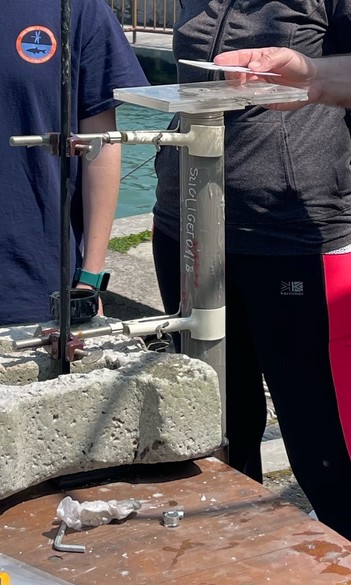Long-term ecological studies in Lake Balaton - sampling in May 2023

We are happy to report that our Balaton sampling planned for the spring of 2023 in the framework of the ELTE 5B Subproject of the National Laboratory of Climate Change took place on May 19-20 and was successfully completed. Due to the rainy and windy weather this spring, we had to postpone the drilling twice, which we carried out in cooperation with the Balaton Limnological Research Institute. According to our plans, undisturbed sediment cores 30-40 cm long were obtained from the Siófoki, Szigligeti and Keszthely basins. As the attached pictures show, in accordance with the requirements of the large number of proxy methods, 3 parallel cores were taken from each point and sliced at a resolution of 1 cm. We will do lead and caesium isotopic dating on the sediments, with the help of which the last 200 years can be precisely dated. From our previous analyses in the Szemesi basin of the lake, we know that the 1-cm sediment slices record the events of an average of 3-12 years. Andrea Zsigmond (Sapientia EMTE) will analyse sediment chemistry, Enikő Magyari (ELTE) pollen, Timea Chamutiova (UMB), Arnold Móra (PTE) and Bea Bartalovics (PTE) orphan mosquito larvae (Chironomidae), János Korponai (NKE) and István Gyulai (DE) with their students small crustaceans (Cladocera). We are also planning to involve young researchers in scope of the National Laboratory project to carry out DNA community metabarcoding and fossil pigment analyses on the sediment. Gábor Vasas from the University of Debrecen, has already started cultivating blue-green algae (cyanobacteria) based on the long viability of the persistent spores of blue-green algae from freshly taken sediment. The Aquatic Botany and Microbial Ecology Research Group of the Limnological Research Institute, led by Boglárka Somogyi, is researching the maximum depth of living picoalgae migration in the sediment. Our aim is to reconstruct the faunistic and floristic community-level changes that have occurred in the lake over the past 200 years, with particular attention to the detection of the effects of increased lake and lake shore use in the past 90 years (after the Trianon Treaty), to detect the effects of climate change, and to determine the safe operating range of the lake. Our results can serve as a basis for the development of nature and environmental protection measures aimed at restoring Lake Balaton to its natural state. Our results can also help recording the past frequencies of blue-green algae blooms, which have increased repeatedly recently. Furthermore, the joint interpretation of sediment chemical, genetic and paleoecological data will help to reveal the driving factors of algal flora and macroinvertebrate fauna change (e.g. climate change, phosphorus and nitrogen load, changes in fish predation).










